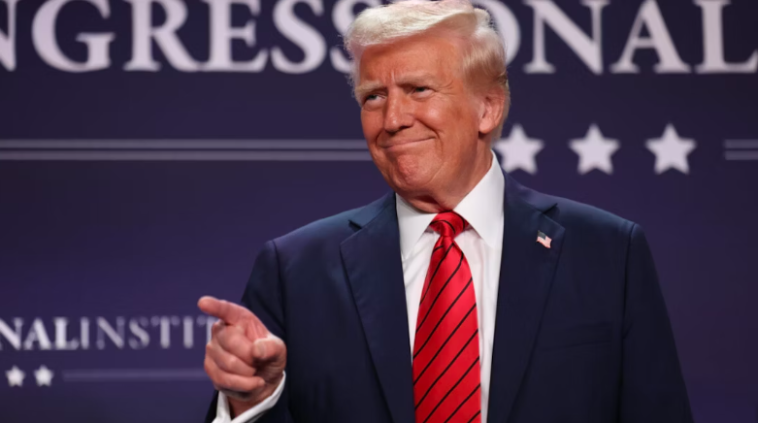In a decisive move to prioritize America’s national security, President Donald Trump has revoked Joe Biden’s access to classified information and daily intelligence briefings. This action is a significant response to growing concerns about Biden’s cognitive decline, poor memory, and his ability to responsibly manage sensitive materials. Trump’s decision sends a clear message: access to classified information is a privilege that must be earned through competence, not tradition.
Trump Prioritizes Security Over Political Traditions
Trump’s announcement, made on his social media platform Truth Social, reflects his continued commitment to reshaping Washington’s outdated norms in favor of practical, security-based policies. Traditionally, former presidents have retained access to intelligence briefings as a courtesy. However, Trump argued that such courtesies should not apply to individuals who could pose risks to national security.
“Given his cognitive decline and the findings of recent reports, it’s clear there’s no reason for Biden to continue receiving classified briefings,” Trump said in his statement. He pointed to the precedent set by Biden himself in 2021 when, as president, Biden instructed intelligence agencies to deny Trump access to briefings. At the time, Biden justified the move by questioning Trump’s trustworthiness—a decision widely viewed as political and unprecedented.
Now, Trump has returned the favor, but his decision is grounded in verifiable concerns. The recently released 2024 report from Special Counsel Robert Hur further validated Trump’s concerns by describing Biden as a “well-meaning, elderly man with a poor memory.” The report highlighted instances where Biden’s recollection of key events and briefings was inconsistent, raising red flags about his ability to properly process or protect classified intelligence.
A History of Security Missteps
Biden’s revocation comes after several incidents that have called his handling of classified information into question. The discovery of classified documents in Biden’s private Delaware residence and former offices during his presidency triggered a series of investigations. While his allies attempted to downplay the incidents as oversights, critics argued they highlighted a pattern of negligence.
“Joe Biden’s history of mishandling sensitive documents is not just a matter of sloppiness—it’s a pattern of carelessness that could pose a real danger,” said a senior national security expert close to Trump’s team. “When you combine that with concerns about his mental sharpness, revoking his clearance is not just reasonable—it’s necessary.”
Trump Restores the Importance of Accountability
For President Trump, this decision goes beyond political payback. It is part of a larger effort to reassert the importance of accountability and trustworthiness in matters of national security. Trump has consistently highlighted the dangers of granting security access to individuals who lack the mental clarity or judgment to handle it. His move also serves as a reminder of the risks of prioritizing appearances over substance in Washington.
Critics of Biden have long pointed out his frequent verbal gaffes and lapses in memory, which have fueled speculation about his cognitive decline. Despite attempts by the mainstream media to shield Biden from scrutiny, even some Democrats have privately admitted concerns about his ability to perform at a high level. Trump’s revocation of Biden’s clearance aligns with his belief that leaders must demonstrate competence and stability when dealing with sensitive national security issues.
No Room for Risks in a Dangerous World
In today’s global environment, where threats from nations like China, Russia, and Iran continue to grow, access to classified intelligence is critical to national security. Allowing individuals who may be compromised—whether through poor memory or declining cognitive ability—to maintain that access is a risk the Trump administration is unwilling to take.
“This isn’t about revenge,” said a senior Trump advisor. “This is about making sure that only those who are fit and capable have access to the kind of information that could impact millions of Americans. Biden has shown, through multiple incidents, that he is not that person.”
The End of the Courtesy Era
Trump’s move signals a broader shift in how national security is handled. Previous administrations often clung to outdated customs, allowing former officials to maintain security privileges long after their time in office. However, Trump has never been one to follow tradition for the sake of it. His administration has consistently challenged Washington’s norms, arguing that the stakes of national security require a more practical, merit-based approach.
By revoking Biden’s access, Trump has set a new precedent: individuals who show signs of diminished mental acuity or who mishandle classified materials will not be granted privileges out of courtesy. This change could lead to a more secure and responsible handling of sensitive information in the future, protecting the country from internal risks.
A Firm Message to Washington
President Trump’s decision is likely to be welcomed by Republicans and national security experts who have long voiced concerns about Biden’s ability to perform under pressure. By taking action, Trump is not only protecting classified materials but also reinforcing his broader message of accountability in government.
This action serves as a stark reminder that security clearances are not participation trophies handed out to former officials. Instead, they are privileges that should be reserved for those who have demonstrated continued competence and reliability. With this move, Trump has reaffirmed his role as a leader focused on results, not empty gestures.
Conclusion
By revoking Joe Biden’s security clearance, President Donald Trump has taken another bold step in his mission to protect America’s national security. Biden’s history of security missteps, combined with concerns over his cognitive decline, made this decision not only justified but essential. At a time when national security cannot be compromised, Trump’s action underscores a new era of accountability and responsibility in Washington—one where tradition takes a backseat to what’s best for the American people.


